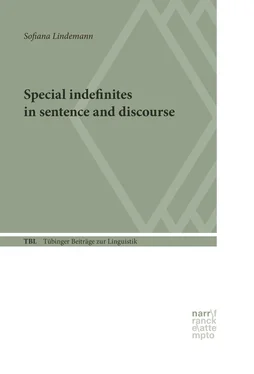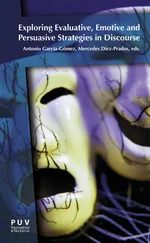Linguistic and psycholinguistic research (Ariel 1990, Brennan 1995, Chafe 1976, Givón 1983, among others) observed that recency of mention, or the distance between antecedent and anaphor implacts the likelihood of pronominalization. Recency can be measured by taking into account the last 20 clauses or more to the left of the referent (Givón 1983, du Bois 1987), or only several clauses back (Clark and Sengul 1979, Brennan et al. 1987, Ariel 1988). However, many studies acknowledge the importance of the immediately previous clause in reference resolution in comparison to referents mentioned two or three clauses back. The general idea is that recently mentiond referents are more likely to be pronominalized compared to referents mentioned more clauses back. Let us consider example (10), which introduces two referents, Paul and a girl . Recency of mention affects the type of referring expression used to refer back to these referents. In sentence (10a), the referent of the girl is picked up in the immediately following sentence, thus, the use of a pronoun is felicitous. In (10b), a sentence intervenes between the two referring expressions associated with the referent of the girl and a full lexical noun phrase is preferred to pick up the referent in the last sentence.
| (10) |
(a) |
Paul 1met a girl 2in the park. He 1said to her 2that it would be nice to go and watch a movie. |
|
(b) |
Pau 1met a girl 2in the park. He 1was enthralled that it was so warm outside. He 1said to ?her 2/ the girl 2that it would be nice to go and watch a movie. |
Example (10) seems to indicate that if several sentences intervene between two mentions of the same referent, then the mental representation of this referent decreases in activation and referring back to this referent by means of a pronoun is less likely. Furthermore, if an entity has not been recently mentioned, other referents that have been mentioned in the intervening sentences might compete for the same accessibility status. Besides recency of mention, givenness has also been associated with accessible information.
2.3.3.2 Givenness or old information
Many linguistic and psycholinguistic investigations (Chafe 1976, Prince 1981, Greene et al. 1994) showed that more elaborated types of referring expressions are used for new entities, whereas less elaborated forms are usually chosen for old or given information. The pronoun in the second sentence in (11) refers back to the subject referent, Ana , which represents old or given information. The second referent, a boy, is introduced in the next sentence by means of an indefinite noun phrase, as he was not mentioned in the discourse before.
| (11) |
Ana 1went to the seaside this morning. She 1was happy to meet a boy 2there. |
The contrast between given and new information usually differentiates between the amount of information which has been explicitly evoked in the discourse (in contrast to implicitly introduced or inferred information). Givenness as a characteristic of discourse referents offers us a superficial insight into the reasons why speakers opt for a particular type of referring expression. Whether a discourse entity way explicitly mentioned in the previous discourse or not is neither sufficient nor necessary to describe the contrast between accessible and less accessible information. In example (12), both Mary and Paula are introduced in the first sentence by means of proper names. However, even if both referents represent given information, the pronoun in the second sentence is used to refer back to Mary , while the second referent, Paula , is picked up by a more explicit type of referring expression, i.e. a definite noun phrase.
| (12) |
Mary 1went to the seaside and saw Paula 2. She 1was very happy to see her friend 2there. |
It thus seems that some referents are more prone to be mentioned with reduced types of referring expressions than others and that givenness cannot be the only factor that modulates this choice. Furthermore, consider a context in which my addressee knows that I have a dog and that this dog suffers of cirrhosis of the liver. It seems very natural for my interlocutor to ask a sentence like the one illustrated in (13) the moment we meet, as a conversation starter, even if we did not mention the dog during the present conversation.
On the basis of shared knowledge or common ground (Stalnaker 1974) between discourse participants, the hearer of sentence (13) is able to identify the intended referent associated to the pronoun he . Shorter types of referring expressions depend not only on explicitly introduced referents, but are sensitive to other types of knowledge (i.e. world knowledge, situational knowledge, discourse knowledge, among others) as well.
Summing up, the dichotomy between given and new information is not sufficient to predict which referent is more accessible at a given time in the discourse. Consequently, this distinction cannot predict which referent will be mentioned again in the discourse, or which type of referring expression will be used for this purpose.
2.3.3.3 Syntactic prominence bias
Structural factors, as for example the syntactic function of a referent, have been shown to impact the accessibility of a referent. According to various studies, referents realized as the grammatical subject are more likely to be subsequently pronominalized and picked up compared to direct object or oblique arguments (Givón 1983, Brennan et al. 1987, Gundel 1988, Crawley et al. 1990, Gordon et al. 1993, Lambrecht 1994, Arnold 1998, Walker et al. 1998, Ariel 2001). An initial sentence like the one in example (14a) is more likely to be continued with sentences (14b) and (14d), in which the initial subject is pronominalized. Note that many speakers consider the continuation in (14c) ungrammatical, if the pronoun refers back to the direct object and not the subject referent.
| (14) |
(a) |
Alex 1called Tom 2to share the great news. |
|
(b) |
He 1told Tom 2(that he has to take a deep breath first). |
|
(c) |
? He 2told Alex 1(that he has to take a deep breath first). |
|
(d) |
Tom 2told him 1(that he has to take a deep breath first). |
Supporting evidence for a subject preference in pronoun interpretation is provided by psycholinguistic literature as well. Clark and Card (1969) showed that in a sentence memory task, grammatical subjects are recalled with more accuracy than referents realized in other syntactic positions. Givón (1983) showed that subjects are referentially more persistent in the subsequent discourse than non-subjects and Crawley et al. (1990) reported that participants took longer to read sentences with object referents compared to sentences with subject referents. Other syntactic constructions that have been shown to impact referring choice are the topic position in languages like Japanese (Walker et al. 1998, among others) and the focus of clefts (Arnold 1998, Almor 1999, Kaiser 2010).
The preferred referent for a pronoun has been furthermore shown to correspond to the referent in the previous clause, which occupies a parallel syntactic position. Thus, the interpretation of an anaphoric pronoun is facilitated if its coreferential antecedent is found in the same syntactic position in the previous clause (Sheldon 1974, Prince 1992, Gordon et al. 1993, Smyth 1994, Arnold 1998, Ariel 2001, Kehler 2002, among others). For example, the subject of sentence (14a), Alex , is mentioned in the continuation sentence (14b) in the same grammatical position (i.e. subject), thus a pronoun referent is chosen to refer back to it. Taking up the direct object referent Tom in sentence (14a) with a pronoun in subject position, as in (14c) is less natural and unexpected, as the two mentions do not occur in grammatical parallel positions.
Читать дальше












